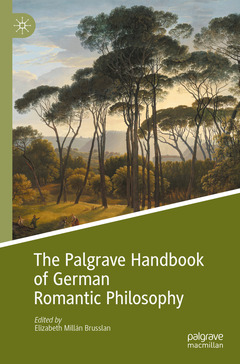Description
The Palgrave Handbook of German Romantic Philosophy, 1st ed. 2020
Palgrave Handbooks in German Idealism Series
Coordinator: Millán Brusslan Elizabeth
Language: English
Subject for The Palgrave Handbook of German Romantic Philosophy:
Publication date: 12-2021
721 p. · 15.5x23.5 cm · Paperback
Publication date: 12-2020
721 p. · 15.5x23.5 cm · Hardback
Description
/li>Contents
/li>Biography
/li>Comment
/li>
This Handbook provides a comprehensive and authoritative analysis of the philosophical dimensions of German Romanticism, a movement that challenged traditional borders between philosophy, poetry, and science. With contributions from leading international scholars, the collection places the movement in its historical context by both exploring its links to German Idealism and by examining contemporary, related developments in aesthetics and scientific research. A substantial concluding section of the Handbook examines the enduring legacy of German romantic philosophy.
Key Features:
? Highlights the contributions of German romantic philosophy to literary criticism, irony, cinema, religion, and biology.
? Emphasises the important role that women played in the movement?s formation. ? Reveals the ways in which German romantic philosophy impacted developments in modernism, existentialism and critical theory in the twentieth century. ? Interdisciplinaryin approach with contributions from philosophers, Germanists, historians and literary scholars.1. The Meaning of German Romanticism for the Philosopher.- Part I. Historical Context.- 2. The Poem of the Understanding: Kant, Novalis, and Early German Romantic Philosophy.- 3. F.H. Jacobi on Reason and Nihilism in Romanticism.- 4. Spinoza and Romanticism.- 5. Religion and Early German Romanticism.- 6. Femininity and the Salon.- 7.Fichte’s Subject and Its Romantic Transformations.- 8. Friedrich Schiller and the Aestheticization of Ethics.- 9. Johann Gottfried Herder: Misunderstood Romantic?.- 10. Hermeneutics and Orientation: Retracing the ‘Sciences of the Spirit’ (Geisteswissenschaften) in the Education-Related Writings of Fichte, Schleiermacher and Novalis.- Part II. Aesthetics and Romanticism.- 11. Philosophical Critique and Literary Criticism in German Romanticism.- 12. Romantic Irony.- 13. The Role of the Fragment in German Romantic Philosophy and Nietzsche.- 14. Early German Romanticism and Literature: Goethe, Schlegel, Novalis and the New Philosophical Importance of the Novel.- 15. The Cinematic Afterlife of German Romanticism.- Part III. Romanticism and the Sciences.- 16. Romantic Biology: Carl Gustav Carus at the Edge of the Modern.- 17. Goethe’s Philosophy of Nature.- 18. Romantic Acts of Generation.- 19. Arts of Unconditioning: On Romantic Science and Poetry.- 20. Romantic Conceptions of Life.- Part IV. Legacy.- 21. Women, Women Writers, and Early German Romanticism.- 22. Romantic Philosophy as Anthropology.- 23. From the Pantheism Panic to Modern Anxiety: Friedrich Schelling’s Invention of the Philosophy of “Angst”.- 24. Romanticism and Pessimism.- 25. Romanticism as Modernism: Richard Wagner’s “Artwork of the Future”.- 26. Between Appropriation and Transmission: The Romantic Thread in Heidegger’s Existential Notion of Understanding.- 27. Sensibility, Reflection, and Play: Early German Romanticism and Its Legacy in Contemporary Continental Philosophy.- 28. ‘The Concept of Critique’: Between Early German Romanticism and Early Critical Theory.- 29. Romanticism, Anarchism, and Critical Theory.- 30. Conclusion: Romantic Currents of Thought: An Open Ending.
Elizabeth Millán Brusslan is Professor of Philosophy at DePaul University, USA. Her research focuses on aesthetics, German Idealism/Romanticism and Latin American philosophy. Her previous publications include: Friedrich Schlegel and the Emergence of Romantic Philosophy (2007) and (with Bärbel Frischmann) Das neue Licht der Frühromantik/The New Light of German Romanticism (2008). In addition, Professor Millán Brusslan contributed “Borderline Philosophy? Incompleteness, Incomprehension, and the Romantic Transformation of Philosophy” to the International Yearbook of German Idealism, Vol. 6 (2009) and has published many articles on the relation between German Idealism and the development of early German romantic philosophy.



